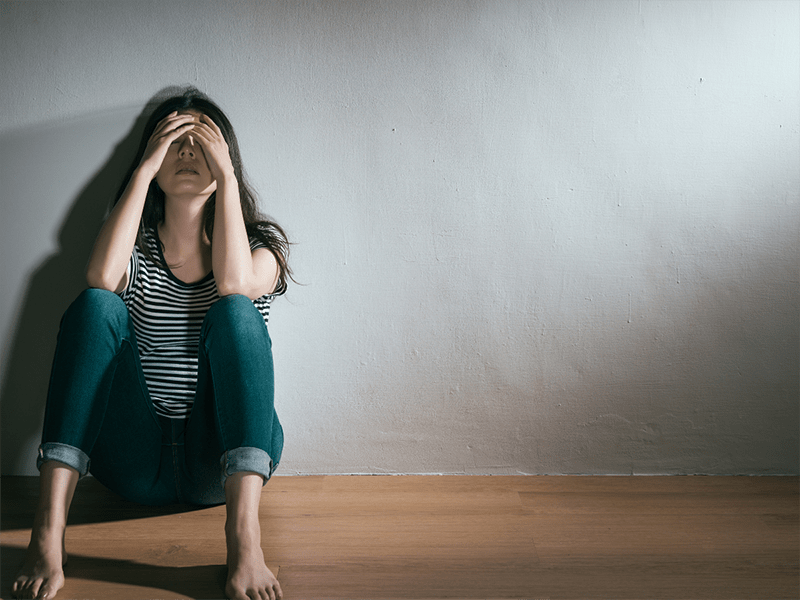
Common Mental Health Diagnoses in Kokomo and Treatment Options
April 1, 2023
Recognizing the Signs: How to Know When It’s Time to Get Help for Your Depression
April 3, 2023Anxiety is a normal part of life, but it can become overwhelming and interfere with our ability to function without disrupting our lives. In this article, we'll explore 10 tips for managing an anxiety disorder and finding a sense of calm. We'll discuss strategies such as mindfulness, self-care, stress management, and lifestyle changes that can help individuals suffering from anxiety find peace and balance in their lives.
Anxiety disorders are the most common mental health disorder in the United States, affecting 40 million adults. That’s 18% of the population! And yet, only 36.9% of people with anxiety Disorder receive treatment.
If you live with anxiety, you know how debilitating it can be. It can make it hard to concentrate at work or school, and social situations can be a nightmare. You might even avoid them altogether.
The good news is that there are plenty of things you can do to manage your anxiety and find a sense of calm. Here are some tips:
1) Understand your triggers.
What makes your anxiety worse? Is it certain situations, like public speaking or flying? Or is it more general, like feeling overwhelmed by life in general? Once you know what your triggers are, you can start to avoid them or prepare for them in advance.
Some of the most common triggers for anxiety include:
- Stressful life events (such as a job loss or divorce)
- Financial problems
- Relationship problems
- Health problems
- Use of alcohol or drugs
- Exposure to violence or trauma
- Having a family member with an anxiety disorder
2) Create a support system.
Let your friends and family know what you’re going through and ask for their support. It’s also helpful to join an anxiety support group so you can share your experiences with others who understand what you’re going through.
Having a strong support system is crucial when managing anxiety disorder. Whether it’s your family, friends, or a therapist, make sure you have someone to talk to about your anxiety. This can help you feel less alone and more understood.
3) Seek professional help.
If your anxiety is really bad, don’t hesitate to seek professional help from a therapist or counselor who can help you develop coping mechanisms and get to the root of your anxiety. Our programs are designed to treat anxiety disorders of all kinds.
4) Get moving. Exercise is a great way to reduce stress and promote overall wellbeing.
If you suffer from anxiety, you know that it can be difficult to find a sense of calm. However, there are things that you can do to manage your anxiety and find a sense of peace. One of the most important things that you can do is to exercise regularly.
Exercise has been shown to be an effective treatment for anxiety. It can help to reduce stress, improve mood, and increase energy levels. Exercise also helps to promote better sleep. When you are well-rested, you are less likely to feel anxious.
There are many different types of exercise that you can do to help with anxiety. You may want to try something like yoga or Tai Chi, which can help to promote relaxation. Or, if you prefer something more vigorous, consider running or weightlifting. Whatever type of exercise you choose, make sure that you stick with it on a regular basis in order to see the most benefit.
5) Create A Coping Plan.
Having a plan in place for when you feel anxious can help you better manage your symptoms. This may include deep breathing exercises, relaxation techniques, or other coping mechanisms. Our therapists are here to help guide you and come up with a coping plan that works for you.
6) Stay Connected.
Isolation can worsen anxiety symptoms, so it’s important to stay connected to family and friends. Talk openly about your anxiety with loved ones and consider joining a support group.
7) Practice Mindfulness and Meditation.
Mindfulness and meditation are two powerful tools that can help you manage anxiety and find a sense of calm. Practicing mindfulness means being present in the moment and paying attention to your thoughts, feelings, and sensations without judgment. Meditation is a form of mindfulness that can help you focus your attention and learn to control your thoughts and emotions.
There are many different ways to meditate, so find one that works for you. There are guided meditations available online or through apps, or you can simply sit quietly and focus on your breath. If your mind wanders, simply bring your attention back to your breath. Start with just a few minutes each day, and gradually increase the amount of time you spend meditating.
8) Write Down Your Thoughts.
If you're struggling with anxiety, it can be difficult to know how to cope. There are many different techniques that can help you manage your anxiety and find a sense of calm. One of the most effective ways to do this is to simply write down your thoughts.
Putting your thoughts into words can help you to better understand them and see them in a new light. It can also be therapeutic to simply get everything out of your head and onto paper (or into a computer document). Just the act of writing can help to lessen your anxiety and give you a sense of control.
When you're feeling anxious, sit down and take some time to write. Don't worry about making it perfect or pretty – just let your thoughts flow onto the page. You may be surprised at what you discover about yourself when you take the time to really listen to your thoughts.
9) Take Time for Yourself.
It is important to set aside some time each day to do something that you enjoy or that relaxes you. This can be something as simple as reading, listening to music, spending time in nature, or taking a bath. Taking some time for yourself each day will help reduce your overall anxiety and help you feel more calm.
10) Get Enough Sleep.
If you're struggling with anxiety, one of the best things you can do is to make sure you're getting enough sleep. Sleep gives your body and mind a chance to rest and rejuvenate, and it's essential for good mental health. If you're having trouble sleeping, there are a few things you can do to improve your sleep habits:
- Establish a regular sleep schedule and stick to it as much as possible. This means going to bed and waking up at the same time every day, even on weekends.
- Create a relaxing bedtime routine and stick to it consistently. This could include taking a warm bath, reading a book, or writing in a journal before bed.
- Avoid caffeine and alcohol in the evening, as they can interfere with sleep.
- Keep your bedroom dark, quiet, and cool to create an ideal environment for sleep.
By following these tips, you can help ensure that you're getting enough quality sleep to manage your anxiety effectively.
Call us anytime to speak with our admissions team. 877-679-2964 or email us at MH@firstcityrecoverycenter.com






